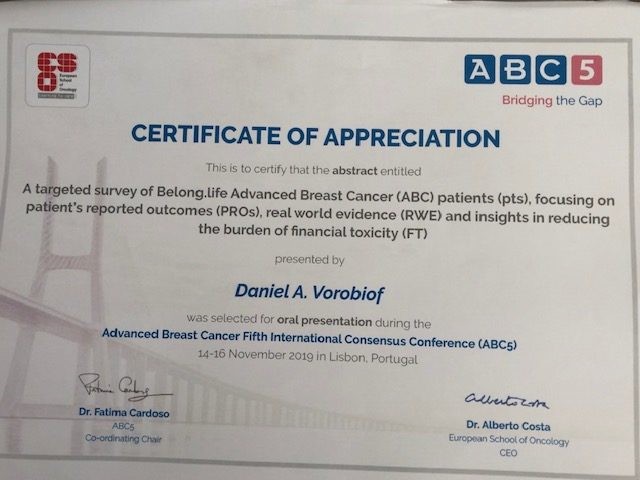Researched by Belong.Life, Published by the The Breast. 2019
A targeted survey of Belong.life Advanced Breast Cancer (ABC) patients (pts), focusing on patient’s reported outcomes (PROs), real world evidence (RWE) and insights in reducing the burden of financial toxicity (FT)
Background: 151 ABC pts, active Belong.life users, the world largest, anonymous and free social media for cancer pts and caregivers, replied to a targeted survey on patient’s unique financial burden experienced during their cancer diagnosis and treatment journeys. They provided in-depth information and real world evidence, sharing tips in how to ease the effects of financial toxicity. The data received was analyzed by scientists using Artificial intelligence (AI) and machine learning (ML) engines to determine the prevalence and characteristics on the real-world occurrence of FT in ABC pts.
Results: 151 female pts replied to the survey, mostly USA based (119, 79%). 41 pts (27%) were less than 50 years (yrs.), 89 (59%) between 50-65 yrs. and 21 (14%) more than 65 yrs. 83 pts (55%) were actively working at the time of ABC diagnosis. 51(61%) reported to have “difficulties in my workplace”. 106 pts (87%) replied that they experienced financial difficulties during their cancer journeys, 28 (26%) were <50 yrs. and 78 (74%) were in the >50 yrs. groups. 54 pts (57%) reported financial burden due to high medical copayments, 51 of them (94%) were USA based. 50 pts (52.5%) reported being off work, while high drug costs were reported by 36 pts (38%) and 12 pts (13%) mentioned living and transportation added costs. When asked how they managed their financial difficulties, most of the pts claimed to receive support from family and friends (41,49%), while others were supported by advocacy groups (11,13%), and from crowdfunding efforts (11,13%). Due to financial difficulties, 22 pts (26%) choose a less expensive drug, delayed their treatments or used alternative medications. 76 pts (50%) were willing to share tips in how to ease the effects of financial toxicity and those included: becoming aware of the high cost of available medications, receiving supportive services, financial counseling and planning , being granted acceptable medical leave, facilitating changes to insurance coverages, addressing costs for out of pocket services, as well as having provisions for domestic assistance, transportation and childcare, and home health care services.
Conclusions: Pts with ABC may experience considerable FT compared to those with early breast cancer or other cancers. Most of the current published data is focused from the perspectives of the providers, pharma and medical insurances. In this unique survey of Belong.life users, we documented RWE of high FT in the majority (87%) of ABC pts, with USA pts claiming high medical copayments as the main contributor to their FT (nearly 5 times higher than the rest of the world pts). Responders to the survey also shared relevant insights in how to cope with the widespread reality of economic burdens affecting them.

For more info: Advanced Breast Cancer Patients, Focusing On Patient’s Reported Outcomes In Reducing The Burden Of Financial Toxicity








